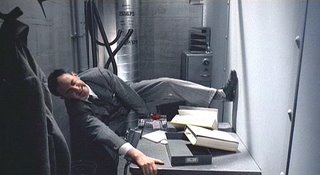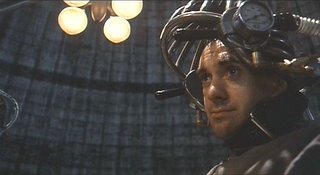Terry Gilliam's movies, to start out simply enough, are definitely not for everyone. All of his works are not confined by the normal constraints of movie storytelling, say, logic, rationality, and reason. Watching a Gilliam film is more like opening the lid on top of the man's head (much like one of his funky Monty Python cartoons) to see what's inside. Gilliam worked on his film Brazil in 1984, and originally worked under the title of 1984 & 1/2 as a simultaneous tribute to George Orwell and Federico Fellini. In the year 1984 it's sure that the totalitarian planet of Orwell's book was on the minds of many people; many were surely wondering how close the world was coming to the bleak, paranoid, government-controlled future described by the British author.
Gilliam was certainly among those questioning the state of the world, and Brazil became his personal take on Orwell's Nineteen Eighty-Four mixed in with Gilliam's own recurring theme of the importance of dreams in human life. The film's protagonist is a meek, mild-mannered government official named Sam Lowry (played brilliantly by Jonathan Pryce) who is working a dead-end job in a dead-end department, working under a brain-dead boss. But as it turns out, that is just the way he likes it. You see, in this world the government is everywhere, watching everyone; as ubiquitous as the ducts that run through every confined living-space in the film. To not get noticed is a safe way for Sam to live out his humdrum life, his only solace being in his adventurous, gravity-defying dreams. Yes, in his dreams he's a flying warrior, saving a fair maiden from the perils of a fantasy world. However, once Sam sees this fair maiden in the flesh on a normal day at the office, dreams and reality start to overlap and the world starts crashing around our poor hero's head.
This is a film noir world of constant paranoia, forever under threat by unknown terrorists, and the government takes extreme measures to keep the public "safe". Citizens flagged as terrorists can be arrested at any time and held without trial, until the imposing Department of Information Retrieval gets what they want from the suspect. The driving force of the movie's plot is a mistaken arrest that happens at the very beginning of the film, when a bored government employee squashes a bug which then falls into the gears of a printing machine, changing the name on an arrest warrant from "Tuttle" to "Buttle". One letter makes all the difference however, since a normal family man has his home busted into by stormtroopers on Christmas Eve. He is wrapped up in a strange canvas straight-jacket while his wife and kids are left screaming in horror. In one of the film's most darkly comic moments, a calm, stereotypically British inspector trots in and shoves a form to be signed into the hands of the frantic wife. He points at the places for her to sign, then declares officially "Here is the receipt for your husband! And here is my receipt for your receipt." The first of many stabs at a stifling bureaucratic system that Gilliam obviously abhors.
The movie continues to show the ridiculous nature of this red-tape world, while also showing the inspiring signs of rebellion against the system. Sam Lowry gets dragged indirectly into the "Buttle-Tuttle" debacle through both his dream woman who happened to live above the wrongfully arrested man, and also the rogue heating inspector Harry Tuttle who swoops in like Spider-Man when he hears of a heating problem that the government is taking too long to fix in Sam's apartment.
Did I mention that the movie is complicated? That there are almost a dozen interesting things going on in every frame? That the humour is (for the most part) pitch black? That dreams and reality overlap to a level (especially near the end) that may drive some viewers crazy? But it all comes down to a perfect bittersweet ending that brings the battle between bleak reality and incredible dreams to a sensible conclusion. It's far from an upbeat ending, and Gilliam had to battle with the studio for quite some time to even get his movie released at all (as documented in the excellent Criterion Edition DVD's extras).
Brazil is not quite a perfect movie: the dream sequences sometimes drag on a bit too long, a few plot points are conveniently brushed aside, and the relationship between Sam and his dream woman seems a little unnatural in its development. This movie, however, is all about the experience: the little moments that accentuate the strange nature of its world. The moment where Sam sneaks past a security team practicing their Christmas Carols. When a man belatedly tries to get off a public tram and get his arms slammed in the doors. When Sam gets promoted to a closet-sized office and has to wage a tugging war over the desk he shares with the man next door. It all comes together into a slightly disturbing but very effective indictment of a bureaucratic world seasoned with Gilliam's dreamlike sensibilities. And I won't even get into the parallels with the current state of the world, because that could probably fill a whole book. Overall, Brazil is a great trip that you'll want to take when you're in the mood for something different.



No comments:
Post a Comment